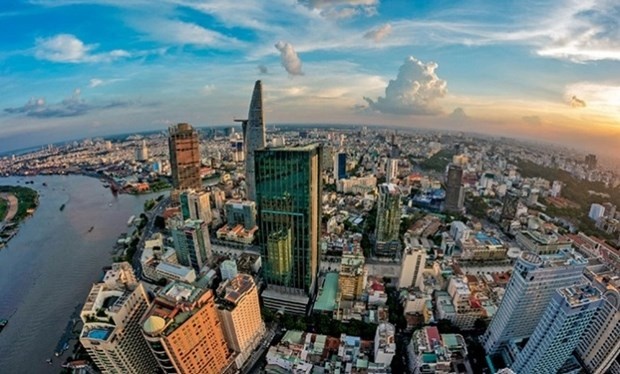The HCM City Economic Forum 2022, which opens on Apr 15, will discuss policy mechanisms, challenges and solutions in boosting digital transformation and improving business competitiveness.

The HCM City Economic Forum 2022, which opened on Friday discussed policy mechanisms, challenges and solutions in boosting digital transformation and improving business competitiveness.
The forum basically focused on how the nation’s biggest city and economic hub can support firms to achieve digital transformation to help develop a digital economy.
The annual international event, themed “Digital economy: Driving force for growth and development of HCM City” was attended by more than 900 delegates, including leaders of the Government, various ministries and sectors.
Representatives from foreign diplomatic agencies and international organisations such as the World Bank, International Monetary Fund and Asian Development Bank as well as renowned economists also attended the forum.
The three-day event will have 25 international speakers, double the number last year. Nine Vietnamese speakers will also address the forum.
Speaking at a recent press conference on the forum, Vo Van Hoan, deputy chairman of the HCM City People’s Committee, who is also the head of the event’s organising board, said HCM City has great potential to develop its digital economy as it has the highest number of smartphone and internet users in the country.
However many enterprises, especially small- and medium-sized ones, face obstacles in achieving digital transformation because they lack capital, human resources and supporting policy mechanisms, he added.
Nguyen Phuoc Hung, deputy chairman of the HCM City Business Association, said the forum also discussed experiences and lessons in digital transformation from local and international firms.
Long-term investment
Do Phuoc Tong, chairman of the Duy Khanh Mechanical Engineering Company, said digital transformation was a long-term and costly affair, meaning it would take years to recover the investment.
“The cost of digital transformation should be considered a long-term investment that can only be recovered in 10 or even 20 years rather than a production cost to be included in the product’s price.”
“Businesses should be patient and persistent,” he advised.
He said it took up to five years for his company to complete its digital transformation and have all data digitised, which has resulted in higher productivity and better strategic planning and higher revenue.
He recommended that the city include digital transformation in its investment stimulus programme to support businesses.
To this end, “any enterprises meeting the criteria set by the investment stimulus programme should be offered preferential loans,” he said.
Apart from investing in machinery to improve production capacity, businesses now need to invest in digital transformation to improve management capacity, Tong said.
Economist Nguyen Thi Canh pointed out that Viet Nam, especially HCM City, has developed a legal framework for digital economy development.
However, the city lacks policy mechanisms to support businesses in digital transformation as they try to recover production; and the human resource base for executing the process remains weak, she noted.
“The four major pillars of a digital economy are institutions, human resources, technology and infrastructure,” she stressed.
HCM City aims to become a digital government and smart city by the end of this year.
It has set a target of having the digital economy making up 15, 25 and 40 per cent of its gross regional domestic product (GRDP) this year, by 2025 and by 2030, respectively.
It will give digitisation priority to 10 sectors - healthcare, education, transport, finance - banking, tourism, agriculture, logistics, environment, energy, and human resources.
Currently, HCM City ranks fifth out of 63 provinces and cities in the ranking for information technology application and development.
The digital economy last year accounted for around 15 per cent of the city’s gross domestic product, or VND191.8 trillion ($8.27 billion), according to a study conducted by the Institute for Development Studies. — VNS





